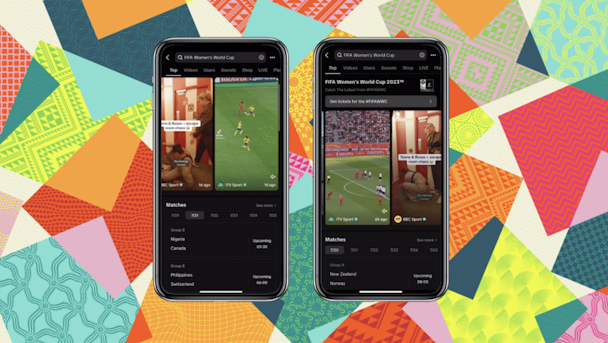Brands like TikTok, EA Sport and Nike are reshaping the discourse around women’s football
As the Fifa Women’s World Cup 2023 draws to a close, Sheena Brobbey, senior creative at Prism Sports & Entertainment, looks into who really won the tournament.

Fifa worked with TikTok to tailer content around the tournament for users
As with any huge sporting event, this year’s Fifa Women’s World Cup 2023 offered a golden opportunity for brands to challenge a traditionally male-dominated landscape and champion women’s football. In the lead-up to the tournament, social listening data from Wunderman Thompson UK revealed a remarkable surge in interest, with a year-on-year increase of 182% and an overwhelmingly positive sentiment of 42% in over a million posts.
As the event drew nearer, discussions were still dominated by male perspectives, accounting for 62% of online posts. Predictable? Maybe… but also a crucial opening for brands to actively engage female audiences and usher in a more balanced and diverse conversation around the women’s game.
Advertisement
During the tournament, the buzz surrounding stories on and off the pitch signaled an era-defining cultural shift, confirming everything that we already knew about football. The women’s game is unpredictable, full of passion, and the next generation of icons are ready to spearhead the charge into the future of women’s football. By advocating for visibility, inclusivity, and equality, brands like TikTok, EA Sport and Nike looked to reshape the discourse. Here’s how they did it.
TikTok: Igniting the digital revolution for women’s football
TikTok’s partnership with Fifa enlisted creators from 16 countries to capture exclusive behind-the-scenes moments, team arrivals and live pre-match content, allowing fans from countries such as Argentina, South Korea, Nigeria and Vietnam to watch the games first-hand through the eyes of their favorite content creators.
This was a clever strategic move from TikTok, which recognized the strength of its growing football audience, a new generation of football fans who are redefining how the game is experienced and shared. The success of the partnership can be seen in the numbers, with 2.5 million followers of the official @fifawomenswwc account and 3.2bn views to date of the official #FIFAWWC hashtag, demonstrating how TikTok amplified visibility for female players, successfully bridging the gap between fans and their heroes.
EA Sports: Redefining virtual inclusivity
EA Sports, known for its iconic Fifa video game, made a profound statement by adding a hijab in a patch update for Morocco’s Nouhaila Benzina in Fifa 23. Benzina’s inclusion also marked a historic moment as she became the first player to wear a hijab at the Women’s World Cup Tournament. This contrasts with France’s top administrative court’s recent decision to uphold the French Football Federation’s rule against women football players wearing hijab headscarves in domestic football.
Advertisement
It’s a progressive move that illustrates how representation on the virtual pitch can send a message about the importance of fostering inclusive spaces for young women in sports that have a lasting impact on cultural perceptions and redefine narratives for the better.
Nike: A duel of empowerment and visibility, but a missed opportunity?
Globally, Nike demonstrated its ongoing dedication to serving and supporting women players with the launch of ‘What the Football’; however, its decision not to sell replica Mary Earps’ or any other goalkeeper’s jersey is facing mounting criticism.
The ‘What the Football’ campaign featured 11 iconic football players who are changing the game and inspiring the world through the power of sport, including Grace Geyoro, Wang Shuang, Alex Morgan and Kadeisha Buchanan. It was powerful to see Nike go further through eleven episodic films which spotlight the unique qualities, personalities and stories of each player featured in the hero spot.
The campaign was amplified on TikTok with ‘1000 Victories’ an activation that asked football fans in New Zealand and Australia to show the world what victory looks like to them for a community documentary. The hashtag, which has 63.2m views to date, is a visual representation of what young football fans look like today, a diverse, new generation of athletes playing free, celebrating fearlessly and defining victory on their own terms.
Suggested newsletters for you
Despite Mary Earp’s heroics in Sunday’s Final which saw her receive the Women’s World Cup Golden Glove and previously the Fifa award for best women’s goalkeeper last year, fans can’t buy her jersey, unlike her teammates’ options. There are no replica goalkeeping jerseys on sale for any competing nation, even though Earp’s Manchester United Adidas WSL shirt sold out last season and ranked third in the club’s sales. Nike has acknowledged change is required and is “working towards solutions for future tournaments.”
So did the Women’s World Cup represent a paradigm shift? The brands that purposefully aligned themselves with the Fifa Women’s World Cup 2023 were the true winners, and perhaps the losers are the brands that let the opportunity pass them by. By authentically engaging female audiences and inviting them into the narrative, these three brands became a notable part of the culture, challenging biases by increasing visibility for the next generation of football players and amplifying diverse female perspectives.
As the momentum of women’s football continues to rise, it’s imperative for brands to seize the opportunity and pave the way for a future where women’s football receives the recognition and support it truly deserves.
Sheena Brobbey is a senior creative at Prism Sports & Entertainment, part of Wunderman Thompson UK.
